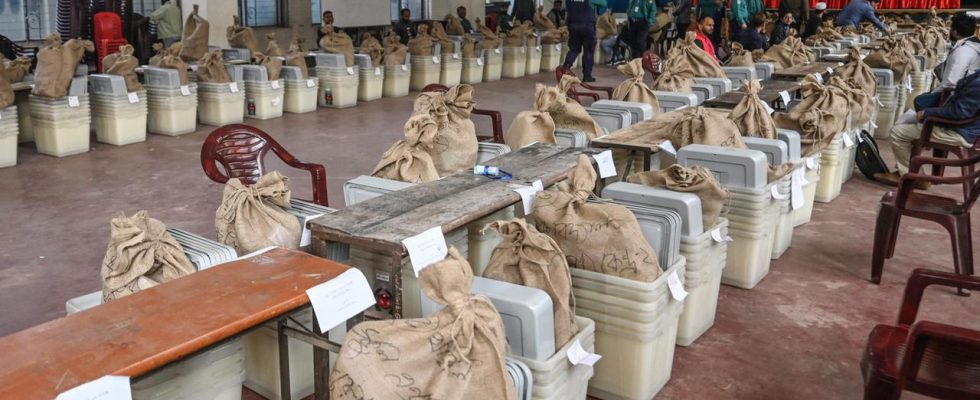The largest opposition party wants to boycott the parliamentary elections in Bangladesh. Prime Minister Sheikh Hasina has arrested thousands of opposition members. A political expert says the result of the election has long been certain.
The clock runs until election day. In the backyard of the Bangladesh National Election Commission building in Dhaka, carpenter Zahirul Islam Apon and his colleagues saw and hammer the final wooden decorations. The election results will be announced here on Sunday evening. The carpenter hopes for a peaceful election day: “The predominant symbol is the boat. The boat will win, it has the best chance.”
The boat is the symbol of the ruling party, the Awami League. All over the capital there are election posters with a portrait of an older woman wearing a headscarf: Prime Minister Sheikh Hasina. She has led Muslim Bangladesh with its more than 170 million inhabitants for three terms in office – now for 15 years. And now it looks like the 76-year-old will be in office again. Because the election campaign was tailored primarily to them.
Prime Minister Sheikh Hasina is considered the favorite in the election.
A balance with light and shadow
In December, the charismatic politician was celebrated by her supporters in front of a holy Muslim shrine. On this day too, she wore one of her trademark iridescent saris. She told reporters about the election: “If the people of Bangladesh cast their vote for the boat and we succeed in forming the government again, we will develop and prosper the entire country.”
Sheikh Hasina initiated many infrastructure projects in Bangladesh and had bridges and tunnels built. And it ensured growth in the textile industry in particular. At the same time, the pandemic and the war in Ukraine weakened the country and it is constantly dependent on international aid funds. Recently, high inflation has also caused problems for many.
Supporters praise her for her good contacts abroad – with different partners such as India, China and the USA. The United States in particular is considered an important partner for the South Asian country – the largest export market for textiles. But it is precisely the USA that is now loudly criticizing the human rights violations in Bangladesh and the restrictions on freedom of expression and freedom of the press. They also recently warned against elections that would not be fair and free.
Many opposition members are calling for a boycott of the election.
Opposition members do not believe in fair elections
Leading opposition figures and activists took to the streets in Dhaka on Friday ahead of the controversial parliamentary election. The main opposition BNP, the Bangladesh Nationalist Party, has called for a boycott of the election and a general strike at the weekend. The current government cannot guarantee a fair vote.
Ashok Kumar Debnath from the National Election Commission firmly rejects this accusation: “The main opposition party is not taking part in the election. But the election itself will be fair.” More than 200 independent observers from abroad would follow the election. The police and army would ensure a peaceful process. Some still expect street protests from the opposition.
Expert sees choice of fate for the country
For political expert Ali Riaz from Illinois State University, the election in his home country is a farce. The result is already clear. “This is being pushed forward by the Prime Minister and her party, but above all by herself. Because power has been concentrated in the hands of the Prime Minister through constitutional and non-constitutional measures,” he says. “Bangladesh has been experiencing increasing democratic regression since 2009.”
20,000 opposition members and activists are now in prison. This election will have a decisive influence on the future of the country, whether there will continue to be different parties or whether Bangladesh will become a one-party state.
In the evening on the street in a residential area of the capital: Lamia is out with her brother, buying food for the cat. The 20-year-old will vote for the first time. “At the moment the electoral situation is not democratic, but I feel like I’m going to vote and hope for the best.” In the streets she mostly sees posters of Sheikh Hasina’s Awami League.
Nevertheless, Lamia is convinced of the long-time prime minister. The young woman believes that she has achieved a lot and will work for young people. A little further on, ricksha driver Mohammad Zahidul Islam is waiting for customers. He earns the equivalent of around five euros a day.
“There used to be a celebratory atmosphere before the election, people were excited,” says Lamia. “Now it has become a one-party election and I don’t know anyone around me who will exercise their right to vote.” It was too expensive for him to travel to his village to register for the election. Above all, he hopes that food prices will fall soon.
Tea seller Mohammad Ratan also hopes for this. He will definitely go to the polls and close his stand. He hopes that everyone can cast their vote peacefully: “Everyone has the duty to use their right to vote, so you should do it.”
Charlotte Horn, ARD New Delhi, tagesschau, January 6th, 2024 3:51 p.m

